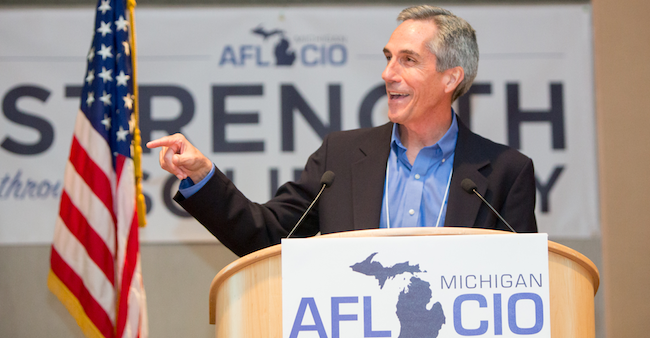The following guest post was written by Ron Bieber, president of the Michigan AFL-CIO. You can sign up to receive legislative action alerts from the Michigan AFL-CIO HERE. You can also follow them at facebook.com/miaflcio, twitter.com/miaflcio, and twitter.com/ronbiebermi.
Enjoy.

Lame duck sessions are when bad bills happen to good people. That’s been true in Michigan after every major election since Rick Snyder took office.
For lawmakers who lost their campaigns or are subject to term limits, lame duck offers one last chance to cast votes for highly controversial bills without having to face any immediate consequences at the ballot box.
That’s exactly what happened in 2012, when Lansing Republicans ignored the will of the people by passing a new Emergency Manager law that was nearly identical to the one that had just been repealed by voters. The 2012 lame duck session was also when Republicans rammed through so-called “right-to-work” legislation.
Unions organized a massive rally and put up a tough fight at the state capitol, but Republicans responded by locking the doors to the building, and using pepper spray on peaceful demonstrators. The bills passed without a single public hearing, and Governor Snyder signed the legislation behind closed doors.
For working people, the 2012 lame duck was a truly shameful chapter in our state’s history. And after last November’s election, it looked like Lansing Republicans were prepared to launch another all-out assault on the rights of working families.
2016 lame duck agenda targeted unions, voting rights
Led by the billionaire DeVos family, Republicans in the legislature were ready to push through a 2016 lame duck agenda that was absolutely terrible for working people. They sought to:
- Eliminate pensions for new Michigan teachers and school employees, forcing billions in cuts to local schools.
- Cut health care benefits for retired police officers and firefighters, forcing them to pay more out-of-pocket due to the dangerous nature of their jobs.
- Slash over $400 million per year from the school aid fund to help pay for more corporate tax breaks.
- Ban unions from representing school employees, bus drivers, and nurses during normal business hours.
- Undermine the First Amendment rights of working people to speak up together at public demonstrations against employers that deny pay, cut wages, and send jobs overseas.
- Allow politicians to raise unlimited political contributions from billionaires and corporations for their political Super PACs.
- Create new barriers to voting that make it harder for senior citizens and people of color to vote in Michigan elections.
These bills all posed a very serious threat to collective bargaining, free speech, and the right to vote – and they all shared one overarching goal: to rig the economy to favor Republicans’ wealthy corporate campaign donors at the expense of regular working people.
How labor fought back and won
To fight back, a broad coalition of unions was formed to organize an aggressive lame duck strategy.
For three straight weeks, lawmakers were bombarded with targeted messages everywhere we could reach them. Hundreds of frontline workers held face-to-face meetings with their lawmakers in Lansing. Volunteers made thousands of phone calls into legislators’ offices, routinely filling voicemail inboxes. Hundreds of handwritten letters were collected and delivered, along with a petition that received over 25,000 signatures.
After weeks of hard work that included a large rally of police officers and firefighters in freezing temperatures on the capitol lawn, the legislature finally adjourned last Thursday without passing any of the bills we fought to defeat.
Even better, we were able to pass important legislation that had strong support from Michigan’s unions, including: a bipartisan energy reform package that protects jobs and ensures safe and reliable energy; bills that lay the groundwork for new veterans homes to be built, and ensure a well-trained and professional workforce to care for our veterans; and legislation that ends the state’s so-called unemployment “robofraud,” which will help job seekers support their families while they get back on their feet.
None of this was easy. Beating bad legislation is tough enough with Republicans in total control of state government, but passing bipartisan legislation is just as hard.
It required unions that don’t often collaborate on legislative issues to lock arms and work together every single day. It required union leaders and rank-and-file members to remain hyper-focused on the most pressing issues, while still being adaptable in a fast-moving environment at the state capitol. And it required constant pressure on legislators.
The blueprint for battles to come
I’m not under any illusion that the bills we defeated in lame duck are dead. Far from it.
Republican politicians including our new president, members of congress, and the legislature will keep working to rig the rules of our economy to favor their billionaire corporate donors at the expense of working people.
That’s why we as progressives can’t afford to waste any time or energy fighting amongst ourselves.
If we want to build an economy that works for all of us, then the lesson we need to learn is that our strength lies in our solidarity. Because when we work together, when we stand up and fight together, and when we have each others’ backs, there is no one who can stop us.



